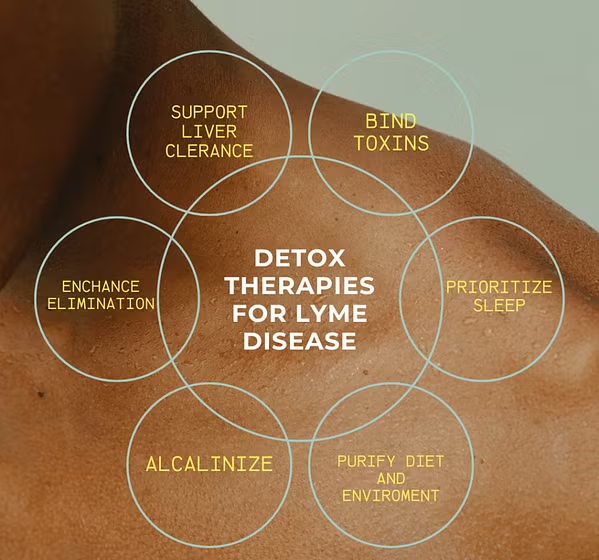Lyme disease especially in its chronic stages can leave the body overwhelmed with toxins, inflammation, and cellular stress. As the immune system battles the infection, detoxification becomes a critical part of the healing journey. Whether you’re undergoing antibiotics, herbal protocols, or simply managing lingering symptoms, a safe and holistic detox for Lyme can make a powerful difference.
This blog will walk you through how detox helps, the best methods to support your body, and how to integrate them safely into your Lyme recovery routine.
Why Detox for Lyme Disease Is Important
Lyme disease, caused by the Borrelia burgdorferi bacteria, can trigger a cascade of issues in the body—from immune dysfunction to neurological symptoms. When treatment begins, especially with antibiotics or herbal antimicrobials, the bacteria die off and release endotoxins into your system. This “die-off reaction,” also known as the Herxheimer reaction, can temporarily worsen symptoms.
Detoxification helps your body clear out these toxins, reduce inflammation, and restore balance. For those with chronic Lyme, detox is not a one-time event—it’s a long-term support strategy.
Key Systems Involved in Detoxing Lyme
Effective detox for Lyme supports several of the body’s natural filtration systems:
- Liver – Processes and eliminates toxins through bile and blood
- Kidneys – Filter the blood and excrete waste through urine
- Lymphatic System – Drains cellular waste and immune debris
- Colon – Removes waste products and prevents toxin buildup
- Skin – Releases toxins through sweat
Supporting these organs gently and consistently can help minimize symptom flare-ups and speed healing.
Signs You Need Detox Support
If you’re dealing with chronic Lyme or in the middle of treatment, you might need detox help if you experience:
- Increased fatigue
- Brain fog
- Mood swings or anxiety
- Headaches
- Muscle aches
- Skin rashes
- Digestive issues
- Flare-ups after starting new treatments
These can indicate that your body is overloaded with toxins and struggling to clear them out.
Safe and Effective Detox Methods for Lyme Disease
1. Hydration and Electrolytes
Drinking plenty of clean, filtered water is crucial. Add lemon for liver support or electrolyte drops to maintain balance, especially if sweating or detoxing aggressively.
2. Detox-Friendly Diet
Eat anti-inflammatory, whole foods rich in antioxidants. Focus on:
- Leafy greens (kale, spinach)
- Cruciferous vegetables (broccoli, cauliflower)
- Garlic and onions
- Berries
- Healthy fats (avocado, olive oil)
Avoid sugar, processed foods, alcohol, and dairy, which can increase inflammation.
3. Dry Brushing and Lymphatic Massage
Stimulating lymph flow helps move toxins out of tissues and into circulation for elimination. Daily dry brushing or professional lymphatic drainage massage can ease congestion.
4. Infrared Sauna Therapy
Sweating through infrared sauna use helps eliminate toxins via the skin, reduces inflammation, and can improve energy. Start slow and always hydrate well.
5. Binders
Binders like activated charcoal, bentonite clay, or chlorella help “bind” to toxins in the gut and escort them out. These should be taken away from medications or supplements and used under professional guidance.
6. Epsom Salt Baths
Soaking in Epsom salts draws toxins through the skin and provides magnesium to soothe sore muscles and improve sleep.
7. Gentle Movement and Yoga
Light physical activity helps pump the lymphatic system and supports circulation. Avoid overexertion—opt for stretching, walking, or restorative yoga.
8. Liver Support Supplements
Milk thistle, dandelion root, NAC (N-acetylcysteine), and glutathione are popular liver-supportive supplements for Lyme detox.
Mental and Emotional Detox
Chronic Lyme can take a toll on your mental health. Emotional detox practices—like journaling, guided meditation, breathwork, or energy healing—help clear emotional toxins and reduce stress that impedes recovery.
Detox Mistakes to Avoid
- Going too fast – Detoxing too aggressively can worsen symptoms
- Ignoring gut health – A sluggish colon can reabsorb toxins instead of eliminating them
- Skipping support – Detox should be supervised by a Lyme-aware practitioner, especially if you have co-infections or sensitivities
When to See a Professional
If symptoms worsen or become unmanageable, consult a holistic practitioner, naturopath, or Lyme-literate MD. Individualized detox protocols are often the most effective.
Final Thoughts
Healing from Lyme disease takes time and detox plays a central role in supporting your body’s ability to recover. Whether you’re newly diagnosed or years into your journey, gentle and consistent detox strategies can help reduce symptoms, boost energy, and restore hope.
